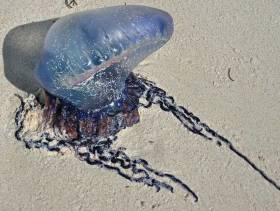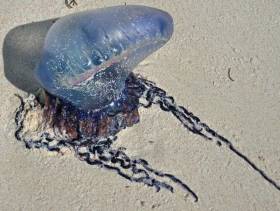Displaying items by tag: Portuguese Man O'War
Ophelia: Coastal Caution Advised Over Portuguese Man O’War Sightings
#Ophelia - Storm Ophelia may have brought on a repeat of last year’s infestation of Portuguese men o’war, an Irish zoologist has warned.
As The Irish Times reports, Dr Tom Doyle of NUI Galway is appealing for caution along Ireland’s coastline after isolated reports of strandings of the tropical marine creature, which packs a potentially lethal sting,
“The southerly winds we had during Ophelia will have swept many up from the Bay of Biscay area, but as yet we have not received many specific reports,” said Dr Doyle.
The days preceding Storm Ophelia’s arrival saw a spike in sightings, he noted, with up to 200 counted as of this morning (Wednesday 18 October).
They are not the only marine wildlife that have washed up on Irish shores with the violent impact of Monday’s hurricane-force winds, as Karin Dubsky of Coastwacth says large numbers of shellfish and octopuses have been beached around the coast.
The Irish Times has more on the story HERE.
Portuguese Man O'War Jellyfish is Largest Infestation In A Hundred Years – Water Safety
Irish Water Safety (IWS) is alerting the public to exercise caution on our south, west and northwest coastline over the next few days due to jellyfish arriving on our shores, as previously reported by Afloat.ie.
IWS says Ireland has experienced tropical maritime air for almost two months now with very little northerly winds, in addition sea water temperatures are approximately 15 degrees Celsius, consequently we have seen one of the largest infestations of the Portuguese Man o'war land on our western seaboard in over a hundred years.
There is a new moon on Saturday which will give us spring tides which will mean that we will have larger exposed areas of coastline where we are likely to see these most venomous siphonophores or to most of us Jellyfish. Surfers, kite surfers, swimmers, kayakers, divers and walkers need to keep a vigilant eye open for these creatures which give a very strong sting and to some people can cause anaphylactic shock or seizures. Local Authorities from Cork, Kerry, Clare, Galway, Mayo and Donegal have reported them on their shores mainly in south and southwest facing bays. There have been reports of in excess of 80 landing on the South Harbour in Cape Clear an in excess of 20 on Keel Bay in Achill. They have been known to kill people such is the severity of their stings.
- Ensure you don't get stung yourself when aiding others.
- Remove any attached tentacles with a gloved hand, stick or towel.
- Do not rub the affected area, this may result in further venom release.
- Rinse the affected area with sea-water (do not use fresh water, vinegar or urine)
- Apply a "dry cold pack" to the area (i.e place a cold pack or ice inside a plastic bag & then wrap this package in a t-shirt or other piece of cloth).
- Seek medical attention if there is anything other than minor discomfort (Please note: The sting can cause anaphylactic shock, if you are feeling unwell go to A&E for treatment).
Members of the public should report the sightings of these two jellyfish to the relevant Local Authority or local Water Safety Development Officer






























































